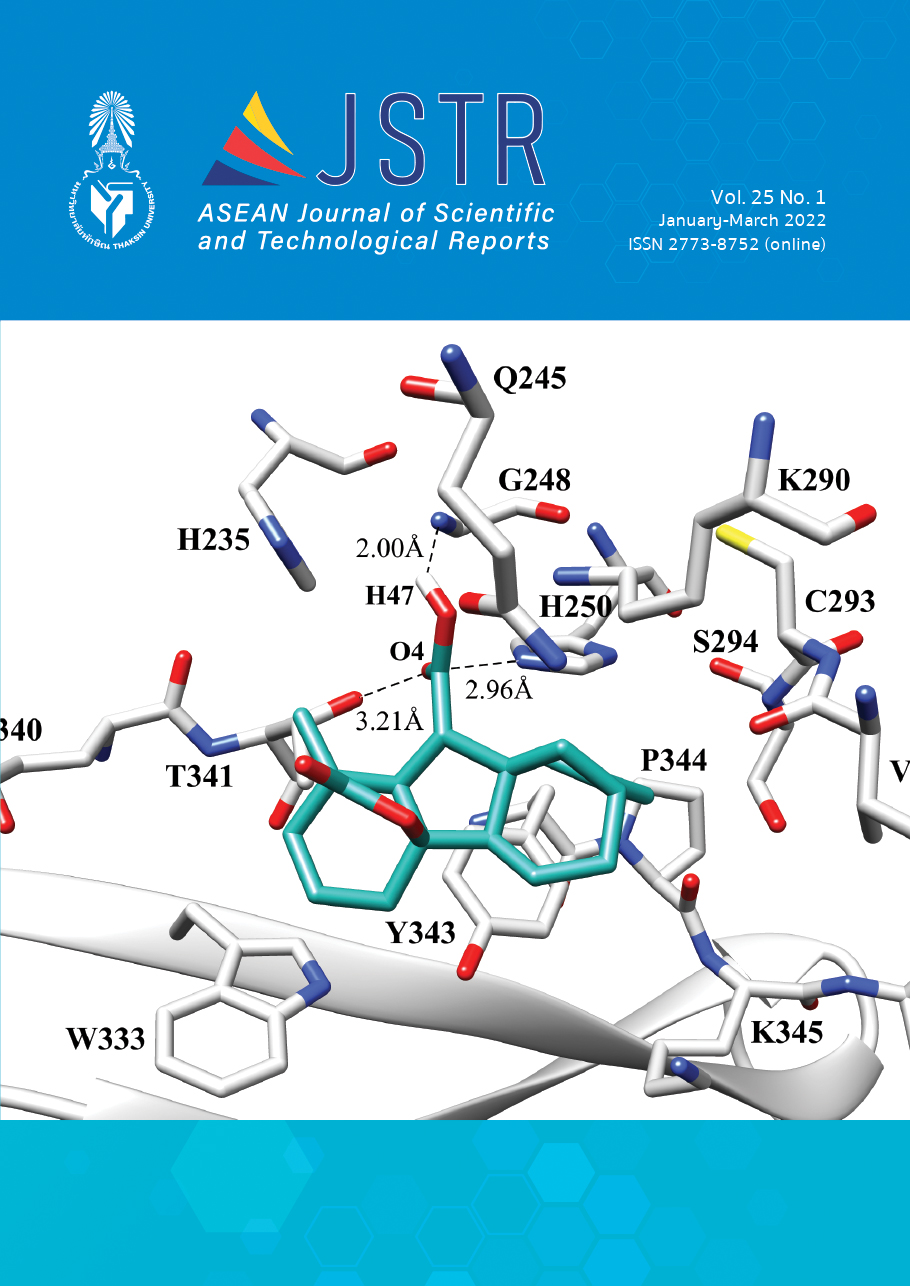Effect of Decomposed-Stone Dust on Properties of Concrete
Main Article Content
Abstract
TThe objective focused on the study of shrinkage behavior of concrete using Decomposed-Stone Dust to replace Portland cement type 1 in the ratio of 10, 15 , and 20 percent by weight of binder as well as designing compressive strength at 280 kg/cm2. Testing the formation time, shrinkage behavior, and compressive strength of concrete was compared with the concrete using Portland cement type 1. The study found that the concrete using Decomposed-Stone Dust was an increased formation period in accordance with the amount of replaced Decomposed-Stone Dust. Autogenous shrinkage, dry shrinkage, and compressive strength of concrete mixed with Decomposed-Stone Dust were less than control concrete. In all mixing ratios, the ratio of 20% replacement of Portland cement dust was the most suitable for this study. The initial formation time was 155 minutes. The final formation period was 305 minutes. The autogenous shrinkage was 312 microns, the dry shrinkage was 699 microns and compressive strength was 286 kg/cm2 respectively at age 28 days.
Article Details

This work is licensed under a Creative Commons Attribution-NonCommercial-NoDerivatives 4.0 International License.
References
Sin Khaotham Pattanakij Co.,Ltd. (2009). Get to know the decomposed stone. Online: http://skpc.co.th/v2.2008/chemical_analysis.php. (12 January 2019)
Choosakul, C. A Study of Decomposed-rock Dust as a Partial Replacement of Portland Cement for Bricking and Plastering Work. In Proceeding of the sixth Annual Concrete Conference. Phetchaburi, Thailand, October 20-22, 2010, pp. 213-217. (In Thai)
Standard Specification for Coal Fly Ash and Raw or Calcined Natural Pozzolan for Use as a Mineral Admixture in Concrete. Annual Book of ASTM Standards, ASTM C618-01, 2001, Vol. 04.02.
Choosakul, C. and Yongsata, K. High Strength Concrete Using Decomposed-Stone Dust. In Proceeding of the twelfth Annual Concrete Conference. Phetchaburi, Thailand, February 15-17, 2017, pp. MAT01-MAT06. (In Thai)
Nemati, K. M. Strength of Concrete. In Concrete Technology University of Washington, USA, 2015, pp. 1-18.
Mora-Ruacho, J.; Gettu, R.; Aguado, A. Influence of shrinkage-reducing admixtures on the reduction of plastic shrinkage cracking in concrete. Cement and Concrete Research 2009, 39, 141-146.
Claisse, P.A. Creep, shrinkage, and cracking of concrete. In Civil Engineering Materials; Butterworth-Heinemann: Oxford, UK, 2016, pp. 241-249.
Portland Part 1 Specification. Thai Industrial Standards Institute, TIS. 15-2004, Ministry of Industry, Bangkok, 2004. (In Thai)
Standard Specification Concrete Aggregates. Annual Book of ASTM Standards, ASTM C33-01, 1997, Vol. 04.02
Standard Practice for Selecting Proportions for Normal, Heavyweight, and Mass Concrete. ACI Manual of Concrete Practice, ACI 211.1-91, 2000, Part 1.
Alsadey, S.; Omran, A. Effect of the Type of Sand on the Properties of Concrete. Journal of Engineering and Applied Sciences 2021, 16, 111-113.
Standard Test Method for Fineness of Hydraulic Cement by the 45-m (No. 325) Sieve. Annual book of ASTM standard, ASTM C430-08, 2011, Vol. 04.02.
Standard Test Method for Time of Setting of Concrete Mixtures by Penetration Resistance. Annual Book of ASTM Standards, ASTM C403-92, 1999, Vol. 04.02.
Standard Testing Method for Slump of Hydraulic Cement Concrete. Annual Book of ASTM Standards, ASTM C143-90a, 2001, Vol. 04.02.
Standard Test Method for Drying Shrinkage of Mortar Containing Hydraulic Cement. Annual Book of ASTM Standards, ASTM C596-09, 2017, Vol. 04.01.
Standard Test Method for Length Change of Hardened Hydraulic-Cement Mortar and Concrete. Annual Book of ASTM Standards, ASTM C157/C157M-17, 2017, Vol. 04.02.
Standard Test Method for Compressive Strength of Cylindrical Concrete Specimens. Annual Book of ASTM Standards, ASTM C39, 2001, Vol. 04.02.
Cai, R.; He, Z.; Tang, S.; Wu, T.; Chen, E. The early hydration of metakaolin blended cements by non-contact impedance measurement. Cement and Concrete Composites 2018, 92, 70-81.
De Sensale, G.R.; Ribeiro, A.B.; Gonçalves, A. Effects of RHA on autogenous shrinkage of Portland cement pastes. Cement and Concrete Composites 2008, 30, pp. 892 – 897.
Neville, A. M. Properties of Concrete. 5th ed; Pearson Education Limited: Harlow, England, 2011.
Mindess, S.; Young, J. F.; Darwin, D. Concrete. 2nd ed. Prentice-Hall, Upper Saddle River, NJ. 2003.
Itim, A.; Ezziane, K.; Kadri, E. H. Compressive strength and shrinkage of mortar containing various amounts of mineral additions. Construction and Building Materials 2011, 25, 3603-3609.


